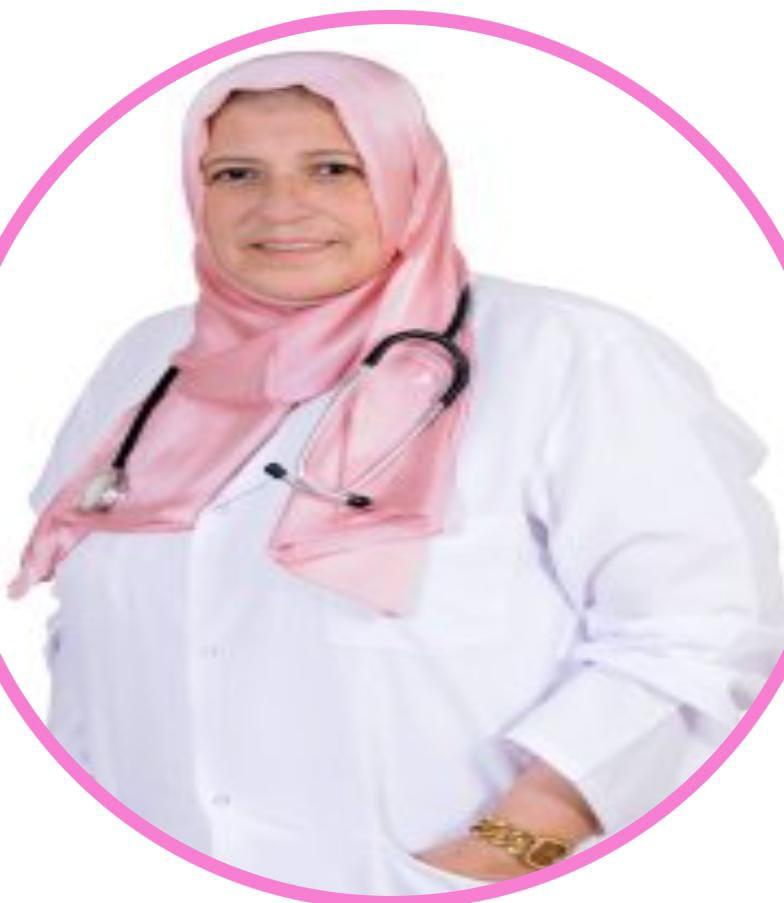Dr. Buthaina Abdul Hasib Taha
Pediatric Chest Consultant

- Name: Dr. Buthaina Abdul Hasib Taha
- Phone: 01224025516 01120283938
- City: Cairo
- Area: Nasr City
Dr. Buthaina Abdul Hasib Taha
Consultant in Pediatrics and Neonatology, specializing in Pediatric Chest Diseases.
Academic Qualifications:
PhD in Pediatrics from a prestigious university
Diploma in Pediatric Chest Diseases
Professional Experience:
Head of the Pediatric Department at Abbassia Chest Hospital, where she supervises the diagnosis and treatment of children with chest diseases and allergies.
Works on providing specialized medical consultations in the field of chest diseases and allergies for children.
Professional Memberships:
European Chest and Allergy Society: Contributes to the development of medical practices related to chest diseases and allergies at the European level.
Egyptian Chest Society: Participates in research and medical activities related to chest diseases in Egypt.
Egyptian Pediatric Society: Contributes to improving the quality of pediatric health care and educating doctors in this field.
Services Provided:
Diagnosis and treatment of allergies in children: including nasal, skin, and food allergies.
Asthma Case Management: Designing treatment plans tailored to symptoms and reducing asthma attacks.
Treatment of shortness of breath: Treating the various causes of shortness of breath in children.
Newborn care: Includes monitoring growth and development and dealing with emergencies.
Working hours:
Daily from 6 pm to 10 pm, including weekends.
Addresses:
Nasr City:
81 El Nasr Road, next to Taiba Mall, 6th floor, above El Barlesy Pharmacy.
El Rehab:
Corner Mall, One Care Clinic, in front of Gate 6.
Phone numbers:
Nasr City: 01224025516
El Rehab: 01120283938
Suggested Results
Speciality: Cardiologist
Price: 250
Phone: 01003020516
WhatsApp: 01003020516
Location: Nasr City, Cairo
Address: Nasr City, Tahrir Street, in front of the First Nasr City Police Station, 7 Youth Engineers Buildings, 3rd Floor, above Al-Burj Lab.
About the Doctor:
Dr. Ahmed Mahmoud Salama Consultant Cardiac and Thoracic Surgeon
✔ PhD in Cardiac and Thoracic Surgery Cairo University✔ Head of the Cardiac and Thoracic ... Read More
FAQ
Pneumonia is an infection in the lungs, and it shows through the following symptoms:
1. Cough: It could have mucus or it might be dry.
2. High fever: Fever with chills (feeling cold with heat).
3. Difficulty breathing: Feeling like you can't take a deep breath.
4. Chest pain: The pain gets worse when you breathe deeply or cough.
5. Fatigue and exhaustion: Feeling extremely tired, unable to get up.
6. Loss of appetite: Not feeling like eating as usual, and sometimes feeling nauseous.
7. Excessive sweating: Especially at night.
8. Muscle aches: Feeling body aches like you have the flu.
9. Mental confusion: Older adults may feel confused or have trouble thinking clearly.
Note: These symptoms can be severe or mild depending on age and health condition.
The recovery time from pneumonia depends on the severity of the condition and the patient's age:
1. Mild cases: Recovery usually takes 1 to 3 weeks.
2. Severe cases or elderly patients: Recovery may take 6 to 8 weeks or longer.
Tips for faster recovery:
1. Get plenty of rest.
2. Stay hydrated by drinking lots of fluids.
3. Follow your doctor’s instructions and take all prescribed medications.
If complications arise or symptoms persist for an extended period, consult your doctor immediately to prevent further health issues.
Pneumonia is an infection that affects the lung tissue itself. This means the air sacs in the lungs become inflamed and may fill with fluid or pus. Its symptoms are clear and include:
1. High fever with chills.
2. Severe coughing, often accompanied by mucus or phlegm.
3. Difficulty breathing, and sometimes chest pain during deep breaths or coughing.
Bronchitis, on the other hand, is an inflammation of the tubes that carry air to the lungs (bronchial tubes). It’s often caused by viral infections or continuous smoking. The main symptoms are:
1. Persistent cough (which may be dry or produce mucus).
2. A feeling of tightness or mild pain in the chest.
3. Wheezing sounds when breathing.
4. General fatigue and exhaustion.
In summary, pneumonia directly impacts the lungs and tends to be more severe, while bronchitis affects the airways leading to the lungs and doesn’t involve the lung tissue itself.
Yes, pneumonia can be contagious, especially if it's caused by bacterial or viral infections. The infection can spread from one person to another through:
1. Coughing and sneezing: From an infected person.
2. Direct contact: Such as shaking hands with someone who is sick.
3. Contaminated air: Inhaling air that contains germs.
To reduce the risk of infection, it’s important to wash your hands frequently, avoid direct contact with sick individuals, and wear a mask if you’re in crowded areas or around infected people.
Symptoms of bronchitis may include:
1. Persistent cough: It can be dry or accompanied by mucus.
2. Difficulty breathing: You might hear wheezing (a whistling sound when breathing).
3. Chest discomfort: A feeling of tightness or heaviness in the chest.
4. Fever: A slight increase in body temperature.
5. General fatigue: Feeling tired and drained most of the time.
6. Nasal congestion or sore throat: A stuffy nose or throat pain might occur.
Note: Bronchitis is often caused by a viral or bacterial infection. The cough may persist even after other symptoms improve.
Bronchitis (acute bronchial inflammation) is usually not dangerous if treated properly. However, in some cases, complications can occur, such as:
1. Chronic bronchitis: If it lasts for a long time or if flare-ups are frequent.
2. Underlying health conditions: Conditions like asthma or heart diseases may increase the risk of complications.
3. Age and weakened immune system: The body may be less able to fight off infections.
4. Rare complications: Such as progression to pneumonia or breathing difficulties.
It is important to consult a doctor when symptoms appear to ensure appropriate treatment and prevent complications.

